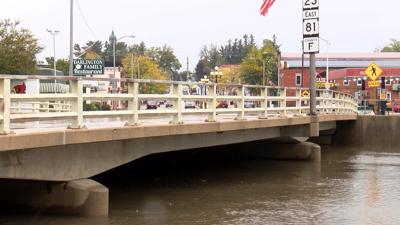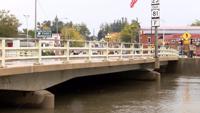WASHINGTON, D.C. (WKOW) — Over $2.7 billion is on its way to Wisconsin for 160 infrastructure projects thanks to the Biden Administration's Bipartisan Infrastructure Law.
$2.4 billion of those funds came after the Biden Administration's Bipartisan Infrastructure Law (BIL) passed.
This money will be used to invest in the state's roads, bridges, public transit, ports and airports and over $150 million for clean water.
Below is a breakdown of the announced funding, what it will be spent on and why, according to a BIL fact sheet issued by the White House.
You can see a map of BIL funding and announced projects in your community online.
Roads and Bridges - $2.2B
There are 979 bridges and over 1,949 miles of highway in poor condition in Wisconsin.
The White House said this will be the largest dedicated bridge investment since the interstate highway system was built.
The $2.2 billion in announced funding includes:
- $2.0 billion in highway formula funding and $90 million in formula funding for bridges in 2022 and 2023.
- $31.3 million through the RAISE program and $80 million through the INFRA program in Fiscal Year 2022.
Affordable High-speed Internet - $100M
Internet is very important for Americans to be able to work, access health care and participate in school, yet 22% of Wisconsinites don't have internet, according to the fact sheet.
The BIL has invested $65 billion nationally so Americans can have access to high-speed internet, with $100 million minimum going to Wisconsin.
Experts estimate that 849,000 households in Wisconsin are eligible for the Affordable Connectivity Program, which cuts internet bills by up to $30 per month, or $75 for households on Tribal lands, and provides a one-time $100 discount off a connected device.
To date, about 279,000 households in Wisconsin are enrolled in the Affordable Connectivity Program. Households can check their eligibility, sign up, and find fully covered internet plans at GetInternet.gov.
Clean Water - $150M
Up to 10 million American households connect to water with lead pipes.
The BIL is the largest investment in clean drinking water in American history, which includes the first-ever dedicated federal funding to replace lead service lines and address PFAS chemicals.
$150 million will be going to Wisconsin to provide clean and safe water across the state and improve water infrastructure.
Public Transit - $115M
Around 37% of public transit vehicles are past their useful life, according to the fact sheet, so this funding seeks to expand sustainable transport options across Wisconsin.
Additionally, non-White households are 5.9 times more likely to use public transport.
Wisconsin is receiving $115 million to improve public transport options in fiscal year 2022, and it can expect to get over $400 million over a period of five years.
"Green" Buses - $25.8M
Low- and zero-emission buses promote cleaner air, reduced health risks— especially for children— and reduced greenhouse gases.
From this year alone, the White House says BIL funding will double the number of clean public transport on American roads.
The $25.8 million is going to the Environmental Protection Agency’s Clean School Bus Program. Wisconsin communities were also awarded $3.79 million for clean transit buses and improved bus service through the DOT’s Low- and No- Emission Bus and Bus and Bus Facilities Program.
Electric Vehicle Charging - $28.4M
$7.5 billion of BIL funding will be used to build the first national network of electric vehicle (EV) chargers. This is part of President Biden's plan to address the climate crisis and support domestic manufacturing jobs.
Through the National Electric Vehicle Infrastructure Program alone, Wisconsin should expect to receive more than $78 million in formula funding over five years to support the expansion of EV charging in the state.
Wisconsin has been allocated $28.4 million to build a network of EV chargers across the state into 2023.
Clean Power and Energy - $109M
Power outages cost the U.S. economy more than $70 billion every year.
BIL funding will be used to address this by making the grid more resilient and building thousands of miles of new transmission lines.
The law also will be investing in clean energy technologies like advanced nuclear, clean hydrogen and carbon capture as well as weatherization to lower energy costs and improve energy efficiency in homes.
The $109 million allocated to Wisconsin will be invested as follows:
- $95 million for weatherization
- $7.9 million through the State Energy Program
- $6.1 million to prevent outages and make the power grid more resilient. Additional grid funding will be made available in the coming months.
Airports - $42M
To improve and modernize airport infrastructure to help America become more economically competitive globally, create jobs, and support better traveling experiences, the BIL is investing $25 billion in airports nationally.
Wisconsin has received $42 million to invest in its airports.
Ports and Waterways - $32M
The White House says America's ports and waterways are in need of "repair and reimagination."
The BIL investment is meant to strengthen supply chains, address maintenance backlogs and reduce congestion and emissions near ports. This has the ultimate goal of helping foods be moved more quickly and at a lower cost.
To date, Wisconsin has received more than $32 million in 2022 for ports and waterways. Wisconsin was recently awarded $10.1 million through the Port Infrastructure Development Program.
Resilience to Climate Change and Extreme Weather - $70.9M
With more frequent floods, wildfires, heatwaves, hurricanes, droughts, power outages and cyberattacks, the BIL is meant to strengthen national infrastructure against these events.
In the last 10 years, the White House states that Wisconsin has experienced 49 extreme weather events which cost the state $20 billion in damages.
Approximately $70.9 million has been allocated to Wisconsin for infrastructure resilience in 2022 including $9.2 million through the Army Corps of Engineers for flood mitigation.
Legacy Pollution Cleanup - $6.5M
Harmful pollutants left over from former industrial sites have negatively impacted surrounding communities and disproportionately impact communities of color.
The BIL will allocate $6.5 million to Wisconsin to clean up Superfund and brownfield sites.
Project Spotlights
There are a number of notable projects across Wisconsin; however, here are a two specific to the area of southwestern Wisconsin.
Dane County Airport Terminal Expansion - $2.6M
The Dane County Regional airport received a $2.6 million grant from DOT’s Federal Aviation Administration to resurface pavement, enhance public transit access and safety and improve traffic efficiency.
You can see map and list of awards online.
I-39/90/94 Wisconsin River Bridges Project - $80M
Columbia County will receive $80 million from the Department of Transportation (DOT) to replace the existing I-39/90/94 Wisconsin River Bridge with two new bridges.
Two bridges for CTH U and CTH V will also be replaced.
The repair is urgent because future repairs could cause frequent and lengthy closures and hurt Wisconsin's key supply chains.














